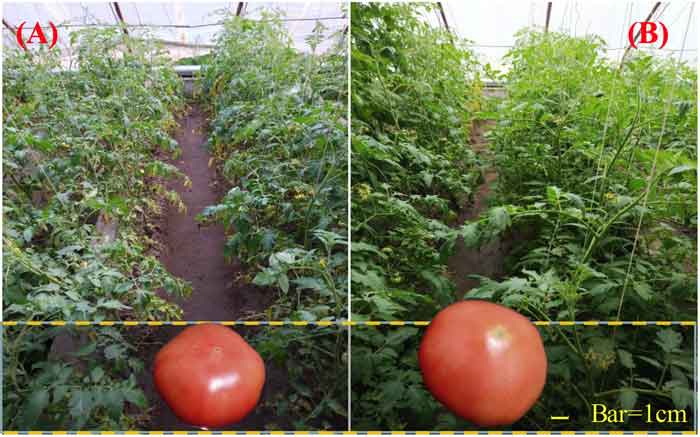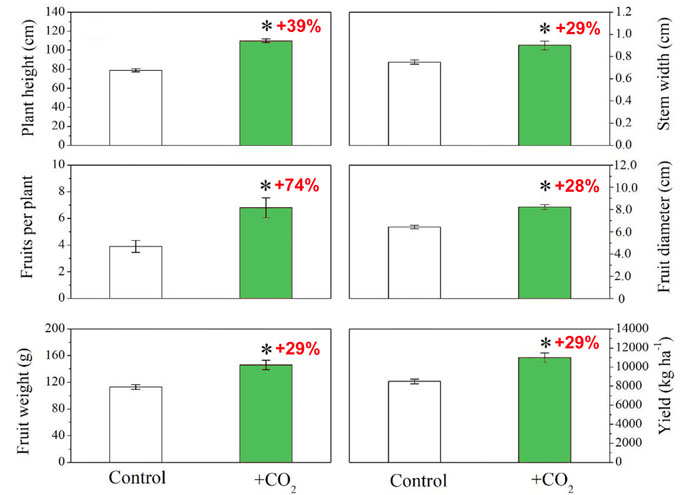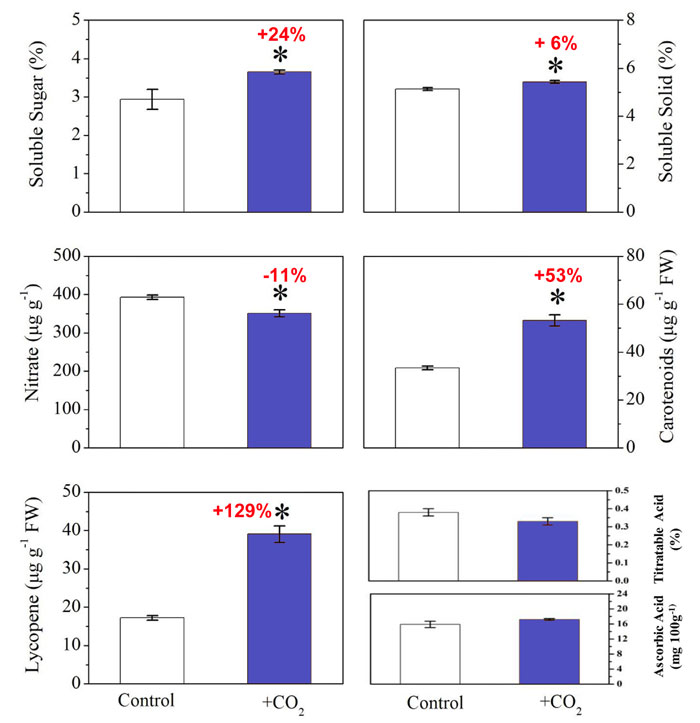| Tweet | Follow @co2science |
Paper Reviewed
Hao, P.-F., Qiu, C.-W., Ding, G., Vincze, E., Zhang, G., Zhang, Y. and Wu, F. 2020. Agriculture organic wastes fermentation CO2 enrichment in greenhouse and the fermentation residues improve growth, yield and fruit quality in tomato. Journal of Cleaner Production 275: 123885, doi.org/10.1016/j.jclepro.2020.123885.
Writing as background for their study Hao et al. (2020) say tomato cultivation in greenhouses has skyrocketed in China in recent years to the point that more than half (57.2%) of all cultivation area of this important fruit occurs indoors. This rapid expansion, in part, is due to a combination of factors, including tomato's unique taste, richness of nutrients and antioxidant properties. In addition, tomatoes are a significant source of a plant compound called lycopene, which reduces levels of low-density lipoprotein (LDL) cholesterol, providing cardiovascular-related health advantages to consumers.
Despite the recent increase in cultivation area, growing tomatoes in a greenhouse environment can often prove challenging. During the day, plant photosynthesis can reduce CO2 concentrations inside a greenhouse to around 100-250 ppm, which level is "far lower than the optimum [and can] seriously affect yield and quality." And since cost is often a prohibitive factor in raising the CO2 concentration inside these greenhouses, researchers in China have been searching for cheap alternatives to enhance greenhouse CO2 levels to reap greater crop growth and yield. And in the particular study of Hao et al., their solution was to install a composting device inside a greenhouse that would raise the CO2 level via fermentation of organic wastes (crop-residues and animal-manure). Consequently, they designed an experiment to examine the growth, development and fruit quality of tomato plants grown in a conventional greenhouse production system compared to an identical system that supplemented CO2 via fermentation of agriculture organic wastes.
The results of the analysis proved that CO2 enrichment via fermentation of agriculture organic waste benefited tomato production. As seen in Figure 1, the tomato plants enriched with CO2 were larger and denser and produced bigger individual fruits. In particular, elevated CO2 increased plant height, stem width, fruits per plant, fruit diameter, individual fruit weight and fruit yield by 39%, 29%, 74%, 28%, 29% and 29%, respectively (Figure 2). What is more, the supplemental CO2 improved the overall fruit quality. In this regard soluble sugar, soluble solids, carotenoids and lycopene were 24%, 6%, 53% and 129% higher than that observed under control conditions, while nitrate contents declined by 11% and titratable acid and vitamin C remained similar in both treatments. Hao et al. also report elevated CO2 enhanced unsaturated fatty acid, amino acid and key secondary metabolites related to food quality. Further, they observed decreased levels of reactive oxygen species detoxification and stress-resistance related proteins at higher CO2. And in light of all of their findings the seven researchers conclude that greenhouses supplemented with CO2 via fermentation of agriculture organic wastes can (1) improve growth and (2) produce higher yields with (3) better fruit quality.

Figure 1. Visual display of the effects of CO2 enrichment by fermentation of agricultural organic wastes on the growth of tomato plants. Panel A = ambient CO2 treatment, Panel B = CO2 enrichment treatment by fermentation of agricultural organic waste. Source: Hao et al. (2020).

Figure 2. Effect of CO2 enrichment by fermentation of agricultural organic wastes on different growth and yield parameters of tomato. The percentages in red text indicate the enhancement due to CO2 relative to control conditions. Error bars represent SD and asterisk (*) represents significant difference at p ≤ 0.05. Source: Hao et al. (2020).

Figure 3. Effect of CO2 enrichment by fermentation of agricultural organic wastes on different tomato fruit quality parameters. The percentages in red text indicate the enhancement (or decline) due to CO2 relative to control conditions. Error bars represent SD and asterisk (*) represents significant difference at p ≤ 0.05. Source: Hao et al. (2020).




